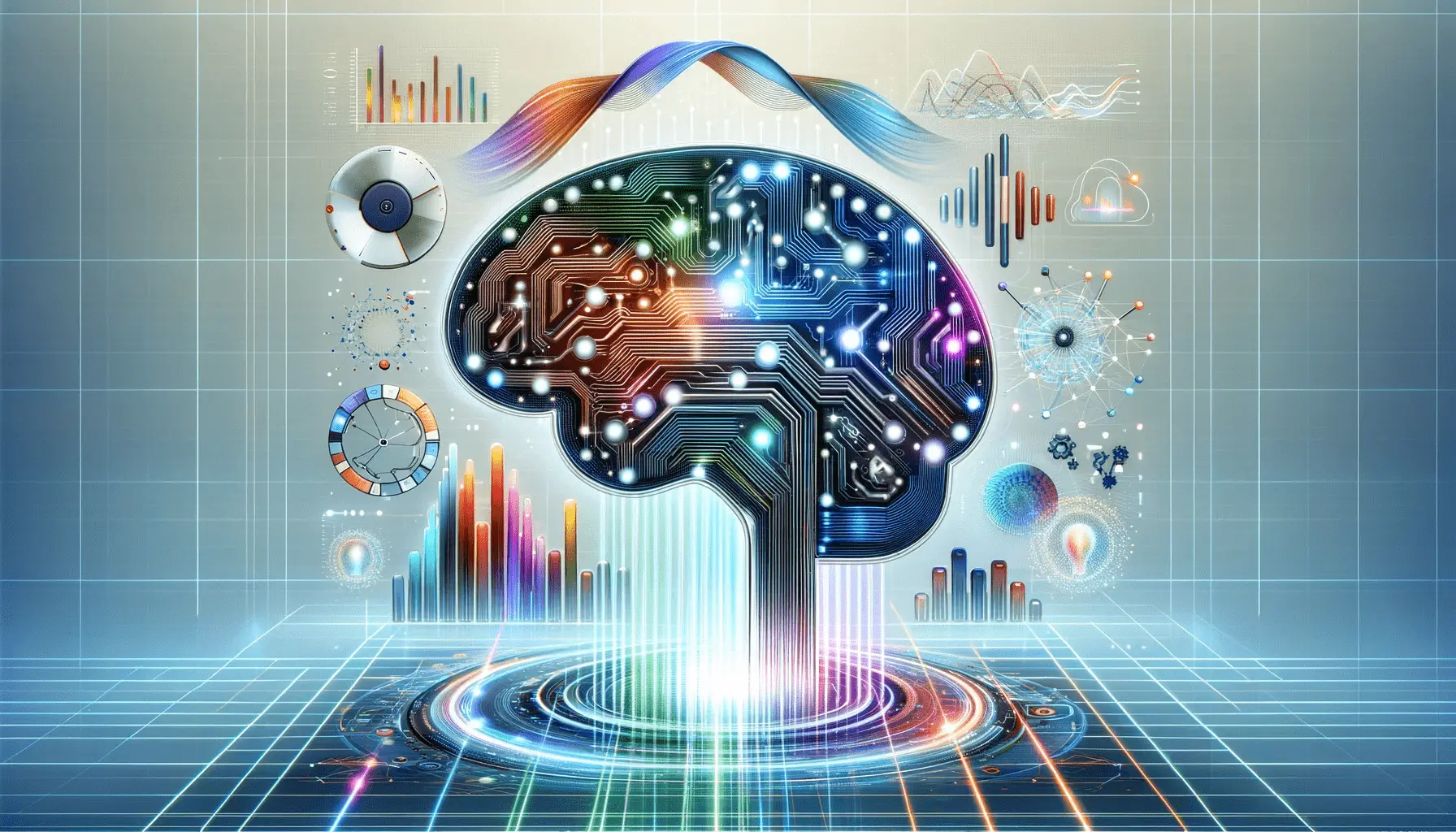The integration of Artificial Intelligence (AI) into Search Engine Optimization (SEO) has revolutionized the way we approach digital marketing.
As businesses strive to enhance their online presence, the synergy between AI and SEO is becoming increasingly crucial.
This article delves into the intricate relationship between AI and SEO, exploring how AI content is reshaping SEO strategies.
At the heart of this evolution is the main keyword “AI Content,” a term that encapsulates the use of advanced algorithms and machine learning in creating and optimizing web content.
This integration is not just a fleeting trend but a fundamental shift in how SEO operates, offering unprecedented opportunities for businesses to improve their search engine rankings and online visibility.
- The Emergence of AI in SEO
- Advantages of AI in Enhancing SEO Strategies
- AI’s Role in Streamlining Content Creation
- Optimizing User Experience and Engagement with AI
- Predictive Capabilities of AI in SEO
- Revolutionizing Link Building with AI
- Challenges and Ethical Considerations in AI-Driven SEO
- Embracing the Future of SEO with AI Integration
- FAQs on SEO and AI Content
The Emergence of AI in SEO
The advent of AI in SEO marks a significant milestone in the digital marketing landscape.
AI’s ability to process and analyze large datasets has opened new avenues for understanding user behavior and search patterns.
This capability allows for more targeted and effective SEO strategies, tailored to meet the specific needs of an audience.
AI-driven tools and platforms are now capable of conducting comprehensive keyword research, predicting search trends, and even suggesting content optimization strategies.
These advancements have made SEO more dynamic and responsive, enabling marketers to stay ahead of the curve in a rapidly evolving digital world.
AI-Powered Keyword Research
One of the most impactful applications of AI in SEO is in the realm of keyword research.
Traditional methods of keyword research often involve manual processes and guesswork.
However, AI transforms this process by leveraging machine learning algorithms to analyze search data, uncovering patterns and insights that would be impossible to detect manually.
This approach not only saves time but also ensures a more accurate and effective keyword strategy.
Content Optimization with AI
AI’s role in content optimization is another area where its impact is profoundly felt.
AI tools can now analyze the structure, tone, and relevance of web content, suggesting improvements that align with search engine algorithms.
This capability ensures that content is not only engaging for readers but also optimized for search engines, striking a balance between readability and SEO effectiveness.
AI’s integration into SEO is not just about automation but about enhancing the quality and relevance of web content, making it more discoverable and appealing to both search engines and users.
As we continue to explore the intersection of SEO and AI content, it’s clear that this collaboration is reshaping the digital marketing landscape.
The following sections will delve deeper into specific aspects of this synergy, highlighting the transformative power of AI in SEO.
Advantages of AI in Enhancing SEO Strategies
The integration of AI into SEO strategies brings a multitude of advantages, revolutionizing how we approach search engine optimization.
From refining keyword strategies to personalizing user experiences, AI’s role in SEO is multifaceted and deeply impactful.
Refining Keyword Strategies with AI
AI’s advanced algorithms are adept at sifting through vast amounts of data to identify the most effective keywords.
This process involves:
- Analyzing search query patterns to understand user intent.
- Identifying long-tail keywords that offer high conversion potential.
- Recommending keyword adjustments based on changing search trends.
Enhancing Content Relevance and Quality
AI tools significantly contribute to elevating the relevance and quality of web content.
They achieve this by:
- Assessing content alignment with user search intent.
- Improving content readability and engagement.
- Ensuring content originality and uniqueness.
Personalizing User Experience
AI’s ability to personalize user experiences is a game-changer in SEO.
This personalization is realized through:
- Customizing content recommendations based on user behavior.
- Optimizing website layouts and navigation for individual users.
- Delivering targeted content that resonates with specific audience segments.
The use of AI in SEO not only enhances the technical aspects of optimization but also significantly improves user engagement and satisfaction, leading to better search rankings and higher conversion rates.
As we delve further into the capabilities of AI in SEO, it becomes evident that this technology is not just a supportive tool but a transformative force in the digital marketing arena.
The next section will explore the role of AI in content creation, a critical component of SEO strategy.
AI’s Role in Streamlining Content Creation
AI’s influence extends significantly into the realm of content creation, offering innovative ways to streamline the process while enhancing content quality.
This advancement in AI technology is reshaping how content is conceptualized, developed, and optimized for SEO.
Automating Content Generation
AI’s ability to automate content generation is a major breakthrough, offering:
- Efficient generation of initial content drafts based on specific prompts.
- Creation of diverse content formats, including blog posts, social media updates, and product descriptions.
- Capability to produce large volumes of content in a fraction of the time required for manual creation.
Enhancing Content Quality and Relevance
Beyond mere generation, AI tools significantly enhance content quality and relevance:
- Utilizing natural language processing to ensure content readability and engagement.
- Optimizing content structure and flow for better user experience.
- Incorporating SEO best practices seamlessly into content.
Personalized Content Adaptation
AI’s capacity for personalizing content is pivotal in engaging diverse audience segments:
- Adapting content tone and style to match different audience preferences.
- Customizing content based on user demographics, interests, and past interactions.
- Creating dynamic content that evolves based on real-time user feedback and interactions.
The integration of AI in content creation not only streamlines the process but also ensures that the content is highly relevant, engaging, and optimized for search engines, thus enhancing the overall effectiveness of SEO strategies.
In the next section, we will explore the impact of AI on user experience and engagement, further underscoring the comprehensive role of AI in shaping SEO strategies.
Optimizing User Experience and Engagement with AI
AI plays a crucial role in optimizing user experience and engagement, key factors that significantly influence SEO performance.
By leveraging AI, businesses can create more intuitive and user-friendly websites, leading to improved user satisfaction and higher search engine rankings.
Enhancing Website Navigation and Usability
AI contributes to website navigation and usability enhancements through:
- Intelligent site search functionalities that quickly direct users to relevant content.
- Dynamic website layouts that adapt to user preferences and behaviors.
- Automated chatbots that provide instant assistance and improve user interaction.
Personalizing User Interactions
Personalization is a key aspect of user experience, and AI excels in this area by:
- Delivering customized content recommendations based on user history and preferences.
- Adapting website features and functionalities to individual user needs.
- Creating a unique and tailored browsing experience for each visitor.
Improving Engagement Metrics
AI’s impact on engagement metrics is profound, leading to:
- Lower bounce rates due to more engaging and relevant content.
- Increased time on site as users find the content more useful and interesting.
- Higher click-through rates from personalized content and calls-to-action.
AI’s ability to enhance user experience and engagement directly contributes to better SEO outcomes, as search engines favor websites that offer value and relevance to their users.
The next section will delve into the predictive capabilities of AI in SEO, highlighting how AI can forecast trends and user behaviors to inform more effective SEO strategies.
Predictive Capabilities of AI in SEO
AI’s predictive capabilities are transforming SEO strategies by enabling businesses to anticipate market trends and user behaviors.
This foresight is crucial in staying ahead of the competition and aligning content strategies with future search patterns.
Forecasting Search Trends and Patterns
AI’s advanced analytics and machine learning models are adept at:
- Identifying emerging search trends and topics before they become mainstream.
- Analyzing historical data to predict future search behaviors and interests.
- Adapting SEO strategies proactively to align with anticipated changes in user search habits.
Understanding User Intent and Preferences
AI’s ability to understand and predict user intent and preferences is a game-changer in SEO:
- Utilizing behavioral data to discern the underlying intent behind search queries.
- Creating content that aligns with predicted user needs and interests.
- Enhancing keyword strategies to target predicted future search queries.
Optimizing for Future SEO Success
By leveraging predictive analytics, businesses can optimize their SEO strategies for future success:
- Adjusting content calendars to incorporate anticipated trends and topics.
- Revising existing content to remain relevant and aligned with future search patterns.
- Staying ahead of competitors by being the first to address emerging user needs and interests.
The predictive power of AI in SEO offers a significant competitive advantage, allowing businesses to not only react to current trends but also to shape and lead future conversations in their industry.
In the next section, we will explore the impact of AI on link building and backlink strategies, further illustrating the comprehensive influence of AI in the realm of SEO.
Revolutionizing Link Building with AI
AI is revolutionizing the approach to link building and backlink strategies in SEO.
By harnessing the power of AI, businesses can enhance their link-building efforts, ensuring they are more strategic, effective, and aligned with SEO best practices.
Intelligent Link Prospecting
AI aids in identifying potential link-building opportunities through:
- Automated analysis of industry trends to identify relevant websites and content creators.
- Using predictive algorithms to suggest sites most likely to link back, based on past behaviors and patterns.
- Streamlining the outreach process by identifying key influencers and authoritative domains within specific niches.
Quality Backlink Analysis
AI enhances the quality of backlink profiles by:
- Assessing the authority and relevance of existing backlinks to ensure they contribute positively to SEO.
- Identifying and disavowing toxic or low-quality links that could harm search engine rankings.
- Providing insights into competitor backlink strategies, allowing for informed decisions on link-building tactics.
Content Optimization for Link Attraction
AI plays a significant role in optimizing content to attract high-quality backlinks:
- Generating content ideas that are more likely to be shared and linked to by other websites.
- Advising on content formats and structures that have historically attracted more backlinks.
- Enhancing the shareability of content through AI-driven insights into user preferences and sharing behaviors.
Contrary to popular belief, AI in link building is not about automating spammy tactics but about enhancing the strategic and qualitative aspects of building a robust backlink profile.
The next section will discuss the challenges and ethical considerations in leveraging AI for SEO, providing a balanced view of this technological advancement.
Challenges and Ethical Considerations in AI-Driven SEO
While AI brings numerous advantages to SEO, it also presents unique challenges and ethical considerations.
Understanding these aspects is crucial for businesses to responsibly leverage AI in their SEO strategies.
Navigating the Complexities of AI Algorithms
Understanding and effectively utilizing AI algorithms can be challenging:
- Keeping up with the rapid evolution of AI technologies and their implications for SEO.
- Ensuring that AI-driven strategies align with the constantly changing algorithms of search engines.
- Deciphering the complex data and insights generated by AI tools to make informed SEO decisions.
Maintaining Content Authenticity and Quality
Ensuring that AI-generated content maintains a high level of authenticity and quality is vital:
- Avoiding over-reliance on AI, which can lead to generic or repetitive content.
- Ensuring that AI-generated content reflects the brand’s voice and adheres to its content standards.
- Balancing AI-driven content creation with human creativity and insight.
Addressing Ethical Concerns
AI in SEO raises several ethical concerns that businesses must address:
- Ensuring data privacy and security, especially when using AI tools that process user data.
- Avoiding biases in AI algorithms that could lead to unfair or discriminatory SEO practices.
- Being transparent about the use of AI in content creation and SEO strategies.
While AI offers transformative potential for SEO, it is essential for businesses to navigate its challenges and ethical considerations thoughtfully, ensuring that their use of AI is responsible, transparent, and aligned with best practices.
As we have explored various facets of AI in SEO, from content creation to link building and ethical considerations, it’s clear that AI is a powerful tool in the SEO arsenal.
However, its effective use requires a balanced approach, combining technological innovation with human insight and ethical responsibility.
Embracing the Future of SEO with AI Integration
As we navigate the ever-evolving landscape of digital marketing, the integration of AI in SEO emerges as a pivotal development.
This article has explored the multifaceted role of AI in transforming SEO practices, highlighting its profound impact on content creation, user experience, predictive analytics, and ethical considerations.
The journey through the realms of AI-driven SEO strategies underscores the necessity for businesses to adapt and innovate continually.
Key Takeaways and Future Outlook
In conclusion, the integration of AI content within SEO practices offers a compelling advantage for businesses seeking to enhance their online presence.
The key takeaways from our exploration include:
- The critical role of AI in refining keyword strategies and content optimization, ensuring that content is not only relevant but also resonates with the target audience.
- The transformative impact of AI on user experience and engagement, contributing to improved SEO performance through personalized and intuitive interactions.
- The predictive power of AI in forecasting search trends and user behaviors, allowing businesses to stay ahead in their SEO strategies.
- The challenges and ethical considerations that come with AI integration in SEO, emphasizing the importance of responsible and transparent use of AI technologies.
Looking ahead, the intersection of AI and SEO presents an exciting frontier for digital marketers.
As AI technologies continue to advance, their application in SEO will undoubtedly evolve, offering new opportunities and challenges.
Businesses that successfully harness the power of AI in their SEO strategies will not only achieve better search rankings but also create more meaningful and engaging experiences for their users.
Ultimately, the future of SEO lies in the harmonious integration of AI and human creativity.
By leveraging AI’s analytical prowess and combining it with human insight and ethical considerations, businesses can navigate the complex landscape of SEO with greater confidence and success.
The journey of AI in SEO is just beginning, and its full potential is yet to be realized.
Want your website to top Google search rankings? Leave the SEO to our professional agency!
FAQs on SEO and AI Content
Explore common questions about the integration of AI in SEO and how it’s shaping content strategies.
AI revolutionizes SEO content creation by automating and optimizing processes, ensuring content is both engaging and search engine friendly.
Yes, AI-generated content can positively impact SEO rankings if it’s original, helpful, and aligns with search engine guidelines.
Google recognizes AI-driven content, focusing on its helpfulness and originality rather than the means of its creation.
Risks include potential quality loss, lack of authenticity, and the need to align closely with evolving SEO best practices.
AI enhances keyword research by analyzing vast data sets, predicting trends, and identifying high-potential keywords.
Yes, AI helps in predicting SEO trends by analyzing search patterns and user behaviors to forecast future changes.
Small businesses can greatly benefit from AI in SEO, gaining insights and efficiency in content strategy and execution.
Yes, ethical considerations include data privacy, avoiding bias in AI algorithms, and maintaining content authenticity.










